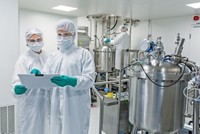Advertisement
Grab your lab coat. Let's get started
Welcome!
Welcome!
Create an account below to get 6 C&EN articles per month, receive newsletters and more - all free.
It seems this is your first time logging in online. Please enter the following information to continue.
As an ACS member you automatically get access to this site. All we need is few more details to create your reading experience.
Not you? Sign in with a different account.
Not you? Sign in with a different account.
ERROR 1
ERROR 1
ERROR 2
ERROR 2
ERROR 2
ERROR 2
ERROR 2
Password and Confirm password must match.
If you have an ACS member number, please enter it here so we can link this account to your membership. (optional)
ERROR 2
ACS values your privacy. By submitting your information, you are gaining access to C&EN and subscribing to our weekly newsletter. We use the information you provide to make your reading experience better, and we will never sell your data to third party members.
Vaccines
Covid-19
Valneva wins UK contract for inactivated coronavirus vaccine
It’s the first major deal for an inactivated virus vaccine outside China
by Ryan Cross
September 19, 2020
| A version of this story appeared in
Volume 98, Issue 36

The UK government has placed an order for 60 million doses of an experimental COVID-19 vaccine from Valneva for about $555 million. The deal includes an additional investment that CEO Thomas Lingelbach says will help double the footprint of Valneva’s manufacturing site in Livingston, Scotland, and allow it to produce 100 million to 150 million doses annually.
Valneva hasn’t released any data about its vaccine candidate, which is still being tested in animals. Clinical studies won’t begin until December. If those trials are successful, Valneva will fulfill the UK’s order in the second half of 2021.
Support nonprofit science journalism
C&EN has made this story and all of its coverage of the coronavirus epidemic freely available during the outbreak to keep the public informed. To support us:
Donate Join Subscribe
Even though Valneva is running later than other firms in the COVID-19 vaccine race, it stands out for specializing in inactivated virus vaccines—a traditional technology that is otherwise conspicuously absent from the vaccine portfolios of US and European countries. The Chinese firms Sinovac and Sinopharm are already testing inactivated virus vaccines for COVID-19 in Phase III clinical trials.
Valneva makes its vaccine by growing the coronavirus in a biosafety level 3 (BSL-3) facility. It inactivates the virus with β-propiolactone, thus preventing its replication. Creating BSL-3 labs and manufacturing facilities is a time-consuming process. “It took 2 months before we could work with the virus in our labs,” Lingelbach says.
In contrast, many of the COVID-19 vaccine front-runners—including AstraZeneca, Moderna, and Pfizer—are developing gene-based vaccines that use RNA or adenoviral vectors to deliver a key coronavirus gene, rather than the virus itself, to our immune systems. These vaccines are rapidly designed and readily manufactured without the need for BSL-3 facilities.
Gene-based vaccines are still largely experimental, however. There are no approved RNA-based vaccines, and viral vector vaccines have only recently been approved for Ebola. Vaccines for hepatitis A, influenza, and polio are all made with inactivated viruses, and so is Valneva’s Japanese encephalitis vaccine.
The deal with Valneva gives the UK government an option to buy up to 130 million more doses of the vaccine through 2025. That could earn the firm more than $1 billion.



Join the conversation
Contact the reporter
Submit a Letter to the Editor for publication
Engage with us on Twitter